The Electronic Intifada 2 August 2023

Palestinians gather in the streets of Jenin refugee camp to declare victory and protest against the Palestinian Authority after Israeli forces withdrew from the camp, 4 July.
ActiveStillsIsraeli forces killed 26 Palestinians in the occupied West Bank during July, the majority in the north of the territory. At least six of those killed were children under the age of 18.
From 3-4 July, 12 Palestinians were killed and 140 were injured during an Israeli incursion into Jenin refugee camp in the northern West Bank – the largest military operation in the territory in more than two decades.
The monitoring group OCHA said it was the highest number of casualties “in a single operation [in the West Bank] since the UN began tracking casualties in 2005.”
Several of those killed were claimed as fighters by the armed wing of Islamic Jihad. One Israeli soldier was killed during the raid.
Israel launched airstrikes on the refugee camp during the two-day offensive and invaded with ground forces, targeting what they said was a command center and safehouse for resistance fighters.
Extremist figures in Benjamin Netanyahu’s government had long agitated for a major operation targeting Jenin – historically a stronghold of armed resistance in the West Bank beyond the reach of the Palestinian Authority.
That pressure became acute after four Israelis were killed in a settlement and after a seemingly routine arrest raid in Jenin in late June went awry when an armored vehicle was incapacitated by a roadside bomb detonated by Palestinian fighters.
Israeli defense minister Yoav Gallant told military reporters that the army had “fully achieved” its objectives during the raid. He said that an explosive workshop was destroyed and the military had secured the ability for occupation forces to move through the camp during future operations.
Israel estimates there to be some 300 fighters in Jenin refugee camp but during the raid its forces – by the military’s own account – only seized 10 improvised explosive devices and the parts of 24 rifles and eight handguns, suggesting that the military didn’t make as big of a dent in the resistance’s capacity as its spokesperson claimed.
Victory
Palestinians in Jenin celebrated after Israel’s withdrawal and resistance factions claimed a victory against occupation forces, with Islamic Jihad stating that fighters had “thwarted the enemy’s tactics.”
Defense for Children International-Palestine said that four Palestinian children were killed during the military offensive in Jenin refugee camp, including 16-year-old Abdulrahman Hardan, who was shot in the head while standing in front of a hospital where he had gone to donate blood.
Another 16-year-old, Mustafa Qassem, died as a result of injuries sustained during an airstrike in the camp.
Nour al-Deen Marshoud, 15, and Majdi Ararawi, 17, were killed by Israeli snipers positioned on rooftops in the camp, according to Defense for Children International-Palestine’s initial findings.
Thousands of residents were displaced during the Israeli raid and 460 homes were damaged or destroyed. Israeli forces bulldozed roads and damaged pipes, causing a cut-off of water supply to the camp.
Meanwhile, Israeli troops shot and killed Muhammad Hassanein, 21, on 3 July during a protest against the raid in Jenin refugee camp near al-Bireh in the central West Bank.
Hassanein, who had a disability after being shot in the leg by soldiers in 2019, was hit in the head with live fire as protesters attempted to flee troops who were chasing them, according to B’Tselem, an Israeli human rights group.
On 4 July, the second day of the incursion in Jenin, eight people were injured, three seriously, in a car ramming and stabbing attack in Tel Aviv.
The alleged assailant, Abd al-Wahab Khalaila, a Palestinian from the Hebron area in the southern West Bank, was executed by an armed civilian.
Two days later, Ahmad Yassin Ghaidan, a 19-year-old Palestinian from the central West Bank village of Qibya, shot and killed a Givati Brigade soldier in Kedumim settlement near Nablus before being shot dead by troops.
Hamas claimed responsibility for the attacks in Kedumim and Tel Aviv, with the spokesperson of its armed wing saying that they were “in response to the enemy’s crimes in Jenin.”
The resistance group also warned Bezalel Smotrich – Israel’s finance minister who lives in Kedumim and seeks to impose Jewish theocratic rule in all of historic Palestine – that its fighters “almost knocked on your door.”
Extrajudicial execution
On 7 July, two Palestinians were killed by Israeli forces in the northern West Bank city of Nablus in what may amount to an extrajudicial execution.
Troops stormed a neighborhood in the Old City of Nablus and surrounded a building amid heavy gunfire, demanding that the two men surrender.
Israeli authorities claimed that the two men – Khairi Shahin, 34, and Hamza Maqbul, 32 – were “killed during an exchange of fire with our forces.”
However, Palestinian eyewitnesses told journalists that the men were killed after they had laid down their arms and asked the troops not to shoot.
That same day, Abd al-Jawad Hamdan Saleh, 24, was shot in the chest and killed while settlers attacked Umm Safa village near Ramallah ahead of a protest march against the establishment of a settlement outpost.
Another Palestinian, 16-year-old Muhammad Fuad Atta al-Bayid, was shot in the head and killed during confrontations with troops in Umm Safa on 21 July.
On 10 July, Israeli forces shot and killed 33-year-old Bilal Qadih near Halamish, a settlement in the central West Bank. The Israeli military said that as troops approached Qadih’s vehicle to question him, he got out and threw a grenade and used as makeshift Carlo submachine gun to fire at the soldiers.
No Israeli soldiers were reported injured. Qadih’s body is being held by Israel as part of its policy, approved by its highest court, of withholding the remains of Palestinians killed in attacks and alleged attacks so that they may be used as bargaining chips in future negotiations.
Northern West Bank
On 20 July, Badr al-Masri, 19, was shot and killed amid confrontations that erupted during an Israeli raid that included police chief Kobi Shabtai at Joseph’s Tomb in Nablus.
The following day, Israeli troops shot and killed 18-year-old Fawzi Hani Makhalfeh near Sebastiya, in the northern West Bank, claiming that the teen attempted to attack soldiers with his car.
The teen’s family disputed Israel’s narrative of events and said that the car in which Makhalfeh was traveling was ambushed by troops.
On 25 July, Israeli occupation forces shot and killed three Palestinian fighters in the northern West Bank.
A firefight between the three Palestinians and Israeli forces broke out in front of an army post at the entrance to a Samaritan community near Nablus.
Samaritans are an ethnoreligious group of about 800 people split between Mount Gerizim in Nablus and Holon, a coastal city in Israel.
Palestinian outlets identified the slain men as Nour al-Din Taysir al-Arda, 32, Muntasir Bahajat Ali Salameh, 33 and Saad Maher al-Kharaz, 43.
The Israeli military is detaining the bodies of the three men, who the armed wing of Hamas claimed as its fighters.
The following day, on 26 July, Muhammad Abd al-Hakim Naim Nada, 23, was shot in the chest and killed by Israeli troops during an arrest raid in al-Ain refugee camp in Nablus.
An eyewitness said that Nada was a bystander who “didn’t do anything and wasn’t involved in anything,” the Israeli daily Haaretz reported.
On 27 July, 14-year-old Faris Abu Samra was shot in the head during confrontations with Israeli troops in the West Bank city of Qalqilya.
More than 200 Palestinians were killed by Israeli troops, police and armed civilians so far this year.
On 1 August, a Palestinian gunman was shot and killed after opening fire and injuring six Israelis in Maaleh Adumim settlement. The same day, 15-year-old Muhammad Zaarir was shot and killed in al-Samu near Hebron, bringing the number of Palestinian fatalities to 204, according to The Electronic Intifada’s tracking.
That figure includes Palestinians who died as a result of injuries sustained in previous years. Thirty-six children are among those killed.
Thirty Israelis and people in Israel were killed by Palestinians in the context of the occupation, mainly in West Bank settlements. That figure includes people who died as a result of injuries from previous years.
According to OCHA, the UN monitoring group, 16 Palestinians, including two children, were injured by Israeli settlers in 44 incidents across the West Bank during two weeks in July.
“In two separate incidents, on 7 and 10 July, two Palestinian children were run over and injured by settlers near the entrances of Beit Ummar (Hebron) and Huwwara (Nablus),” OCHA said.
Murders spike among Palestinians in Israel
Meanwhile, 28 Palestinians in Israel were murdered in July, likely making it the deadliest month of intercommunal violence ever for the community amid a spike of killings.
Palestinians in Israel point to socioeconomic and political marginalization as a result of decades of state policies discriminating against the community.
Also during the month, 11 people were killed during clashes between forces with Fatah, the Palestinian party headed by Mahmoud Abbas, and Islamist groups in Ein al-Hilweh, the largest Palestinian refugee camp in Lebanon.
Thousands of residents have fled the violence in Ein al-Hilweh, home to around 63,000 people.
The camp was established to house Palestinians expelled from their homeland during the creation of the state of Israel. Israel denies millions of Palestinian refugees and their descendents from returning to their lands and homes on the basis that they’re not Jewish.
Ein al-Hilweh’s residents include Palestinians displaced during the Lebanese Civil War and during months of fighting between the Lebanese army and the Salafi group Fatah al-Islam in 2007.
Palestinians living in Syria who fled to Lebanon during that country’s civil war have also sought refuge in the camp.
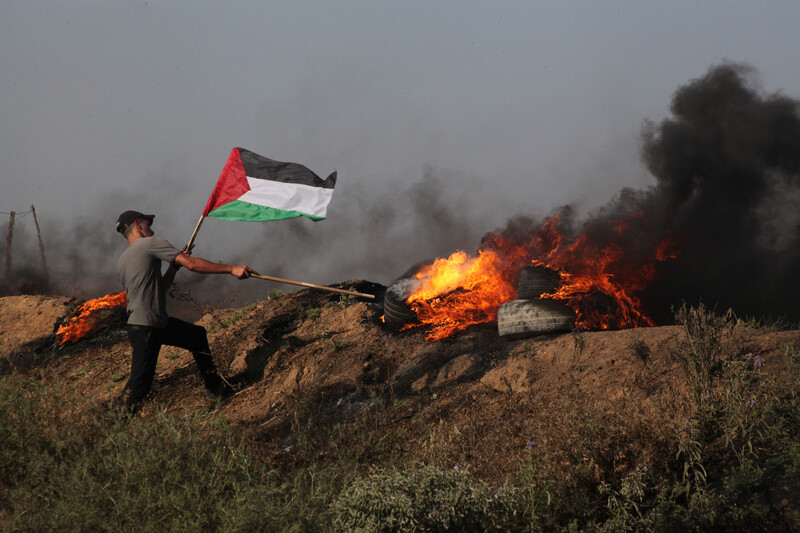
Palestinian protesters burn tires during a demonstration against the raid in Jenin refugee camp near the fence on the boundary with Israel, east of Gaza City, 3 July.
APA images
Palestinians attend an event in Gaza City on 3 July honoring mothers of Palestinians who were killed during the Gaza battle between Islamic Jihad and Israel in May.
APA images
Palestinians launch fireworks at Israeli forces during the second day of a major military operation with air and ground forces in Jenin refugee camp, 4 July.
ActiveStills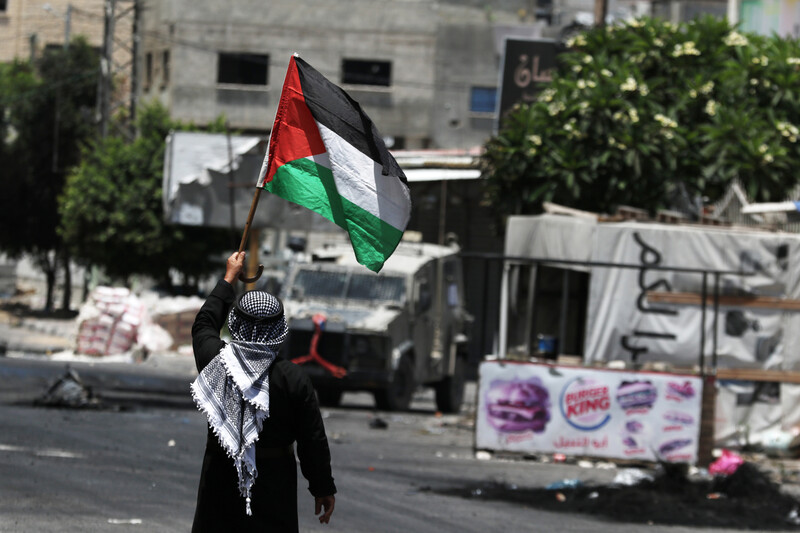
A Palestinian raises his national flag towards an Israeli military jeep during the second day of a major Israeli military operation in the Jenin refugee camp, 4 July.
ActiveStills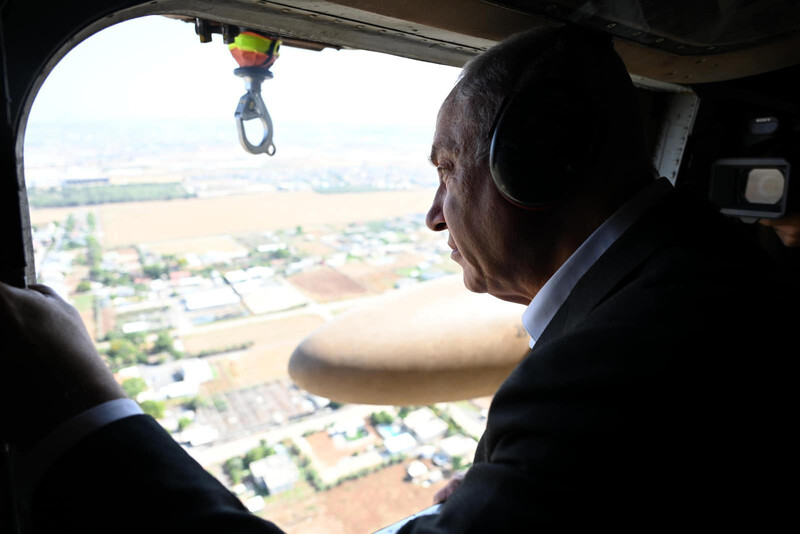
Israeli Prime Minister Benjamin Netanyahu surveys the outskirts of Jenin from the air on 4 July during the biggest military operation in the West Bank in years.
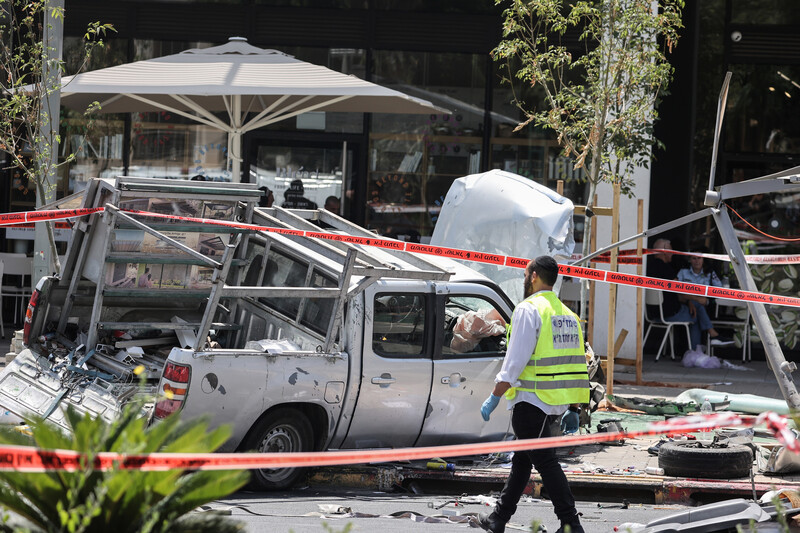
Israeli personnel inspect the site of a car-ramming and stabbing attack in Tel Aviv in which eight people were injured, three seriously. The alleged assailant, Abd al-Wahab Khalaila, a Palestinian from the Hebron area in the southern West Bank, was executed by an armed civilian.
DPA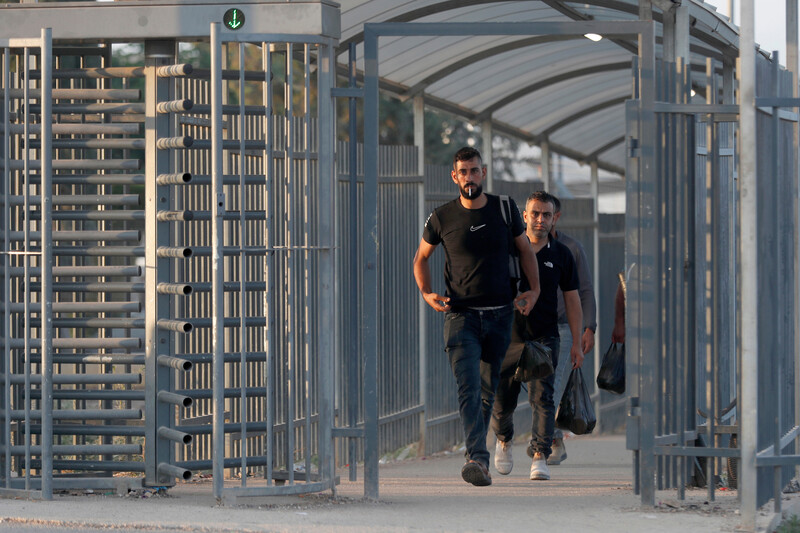
Palestinian workers cross Jalameh checkpoint near the West Bank city of Jenin on their way to work in Israel, 5 July.
EFE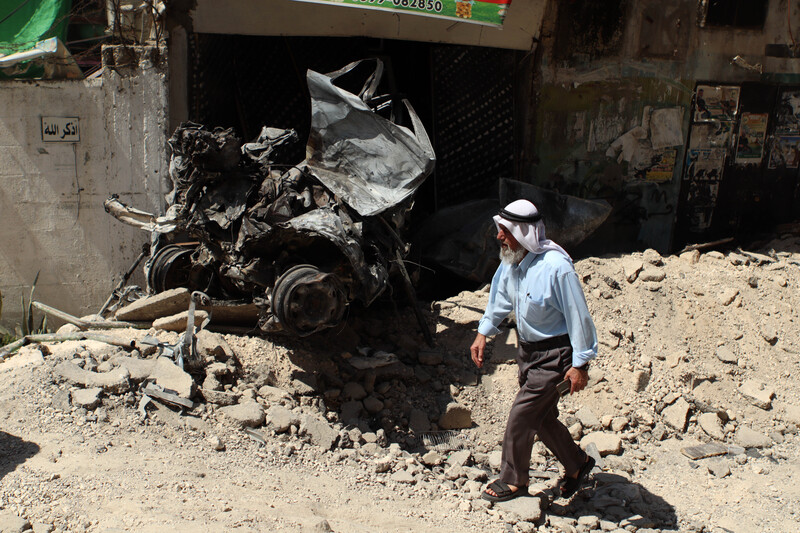
Palestinians return to the heavily damaged Jenin refugee camp in the northern West Bank the day after the end of an Israeli military operation, 5 July.
ActiveStills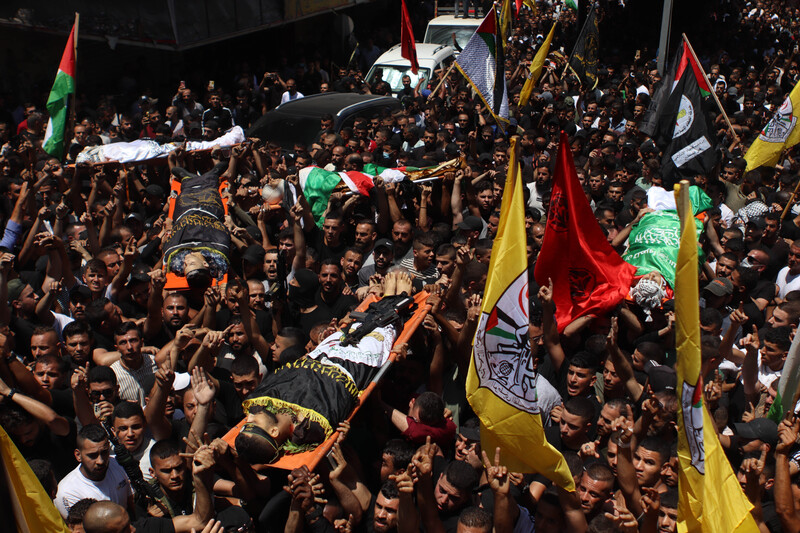
Palestinians hold a mass funeral for some of the 12 Palestinians killed during an Israeli raid targeting the armed resistance in Jenin refugee camp, 5 July.
ActiveStills
Israeli soldiers search cars at a checkpoint near the settlement of Kedumim in the northern West Bank following an alleged shooting attack on 6 July.
APA images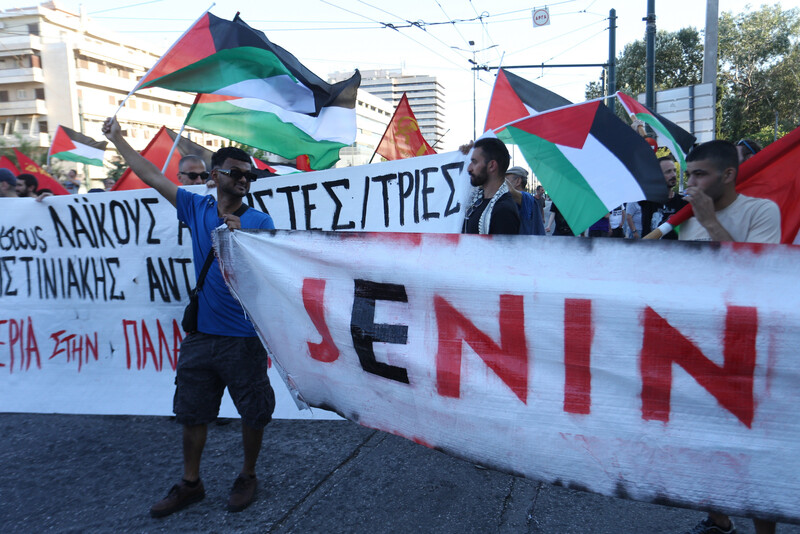
People gather to protest against Israel’s airstrikes and raids on Jenin at the Israeli embassy in Athens, Greece, on 6 July.
ZUMA Press Wire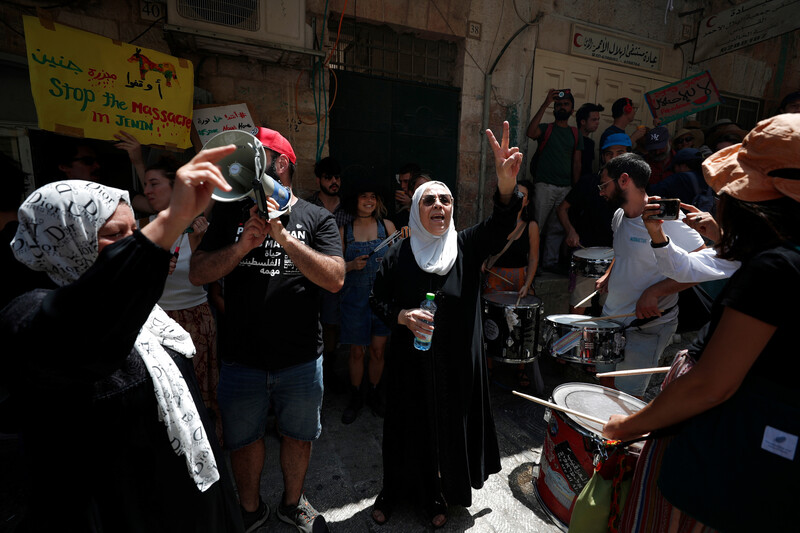
Nora Sub Laban gestures during a solidarity protest rally with Israeli and Palestinian activists outside her home in the Muslim quarter in Jerusalem’s Old City, 7 July. The family was expelled from their home days later to make way for Jewish settlers.
EFE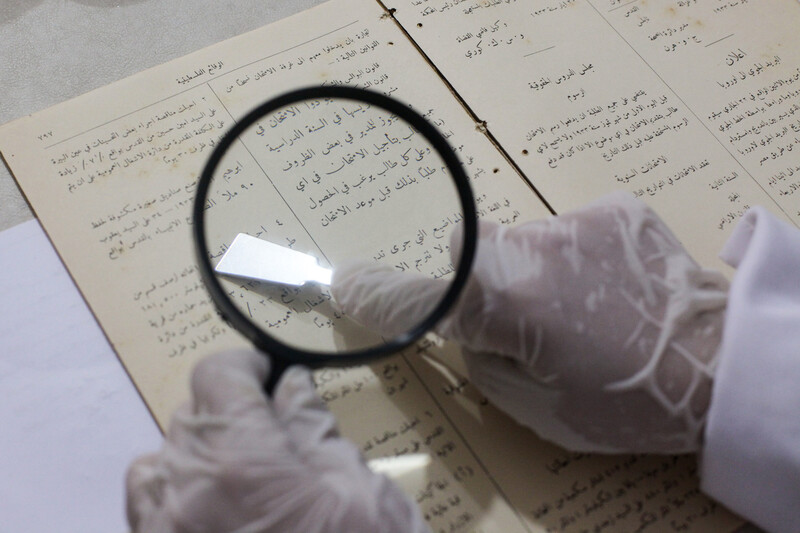
Palestinian researchers with the Eyes on Heritage Foundation repair and archive historical books and manuscripts in Gaza City on 10 July.
APA images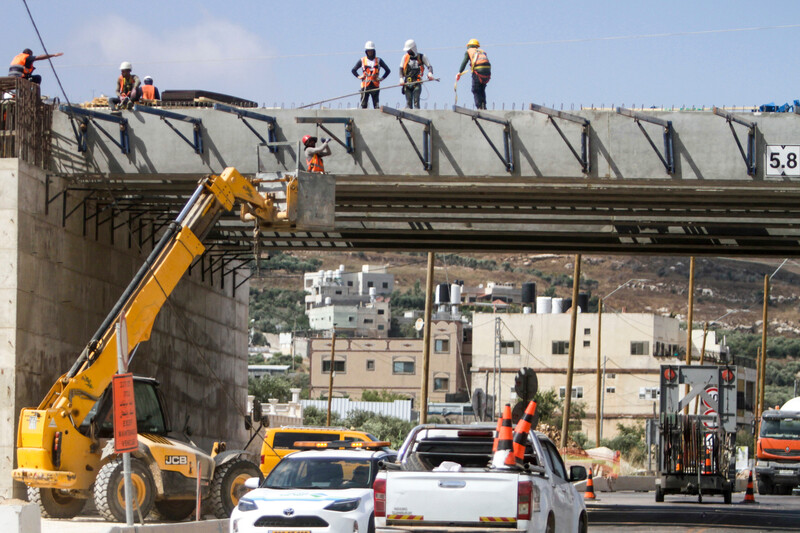
Workers build a bypass road for settlers in the town of Huwwara, south of the West Bank city of Nablus, 10 July. Huwwara was attacked by a mob of Jewish settlers earlier this year after two Israeli brothers were shot and killed in the town.
APA images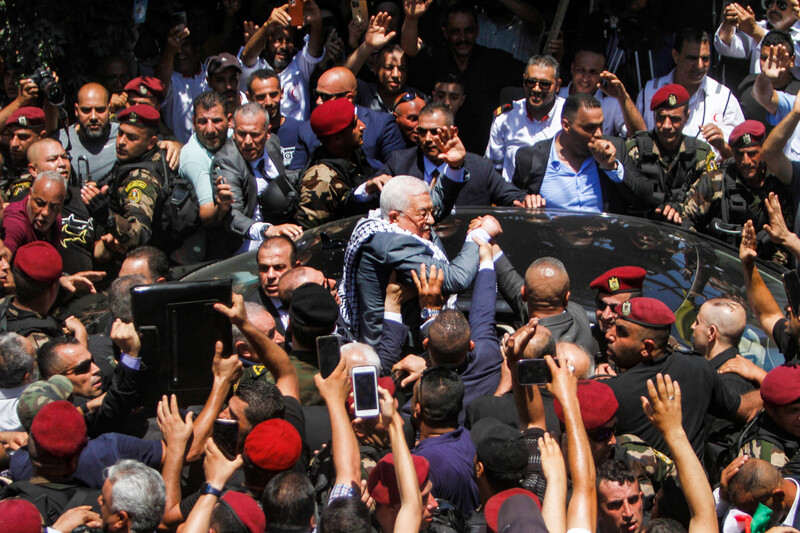
Palestinian Authority leader Mahmoud Abbas arrives at Jenin refugee camp on 12 July, one week after the largest Israeli raid there in decades.
APA images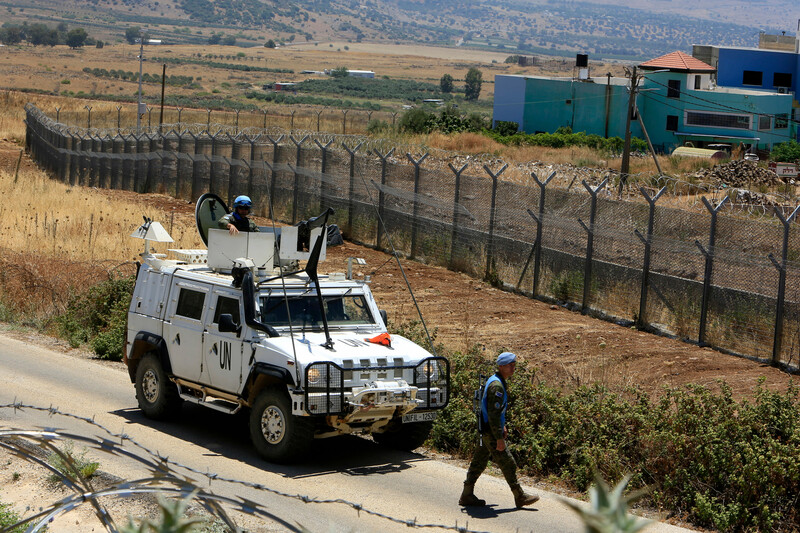
United Nations Interim Force in Lebanon (UNIFIL) peacekeepers patrol in Lebanese territory, opposite the barbed wire fence erected by Israel to annex the Lebanese part of the town of Ghajar, 12 July. UNIFIL urged Lebanon and Israel to stop any action that may lead to an escalation in southern Lebanon a few hours after three Hizballah members were reportedly injured in an Israeli drone attack near the border.
Xinhua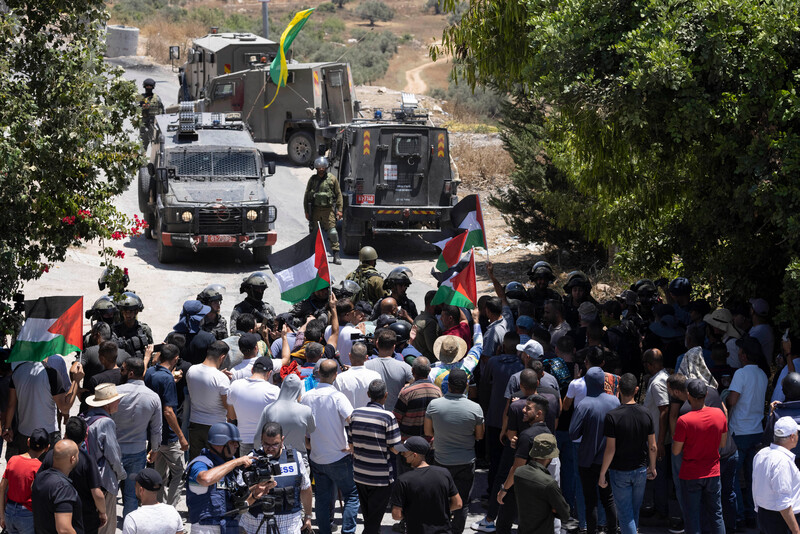
Israeli forces attack a protest against a new settlement outpost built on land belonging to the West Bank village of Umm Safa near Ramallah, 14 July.
ActiveStills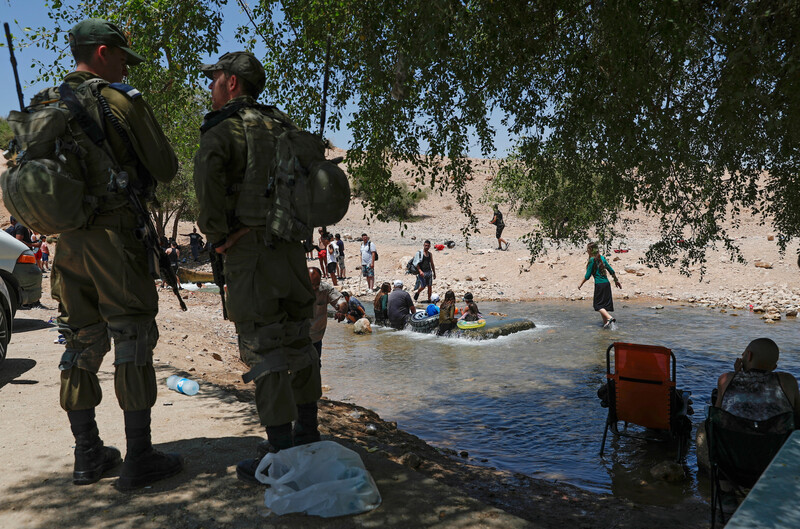
Israeli soldiers guard a spring next to the Palestinian village of al-Auja in the Jordan Valley of the West Bank on 14 July as Israeli settlers and Palestinians cool themselves in the water.
EFE
Fighters from the Fatah faction hold their weapons during a memorial service for Palestinians killed by Israeli forces in Balata refugee camp in the West Bank city of Nablus, 15 July.
APA images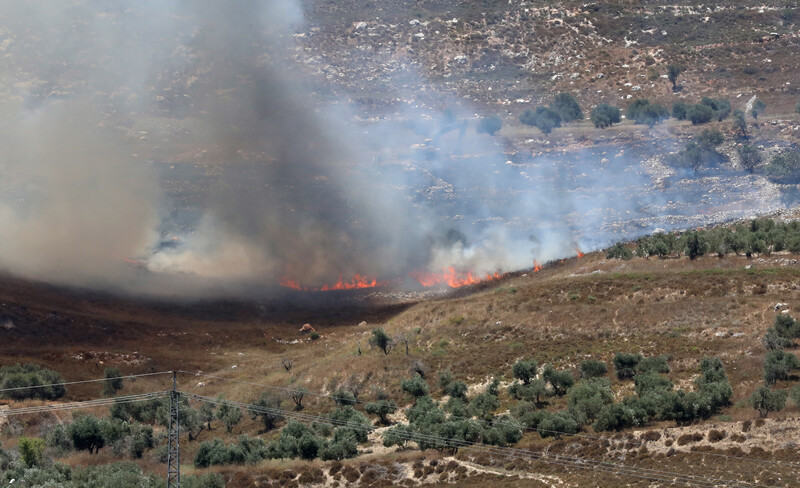
A fire started by Israeli settlers in an olive grove on Palestinian land close to the village of Burin, near the West Bank city of Nablus, 16 July.
EFE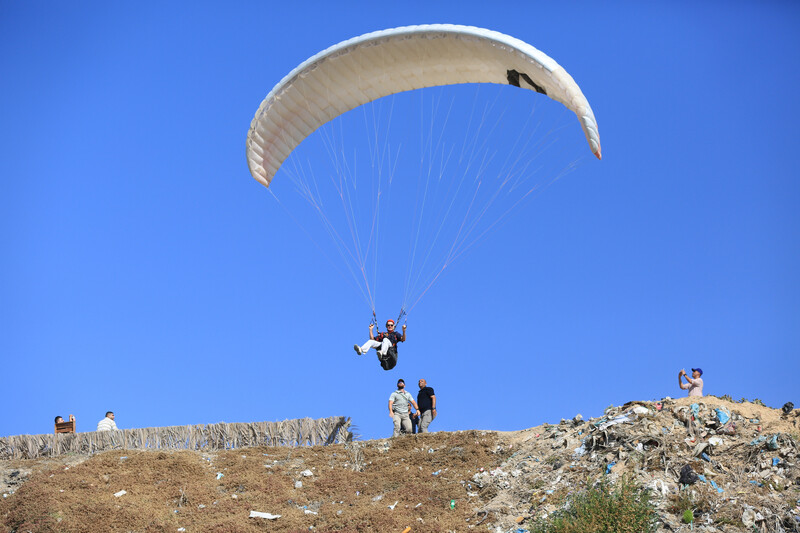
Sven Kühn von Burgsdorff, the outgoing EU envoy to the West Bank and Gaza, paraglides in Gaza City in a stunt intended to bring international attention to the siege on Gaza, 16 July.
APA images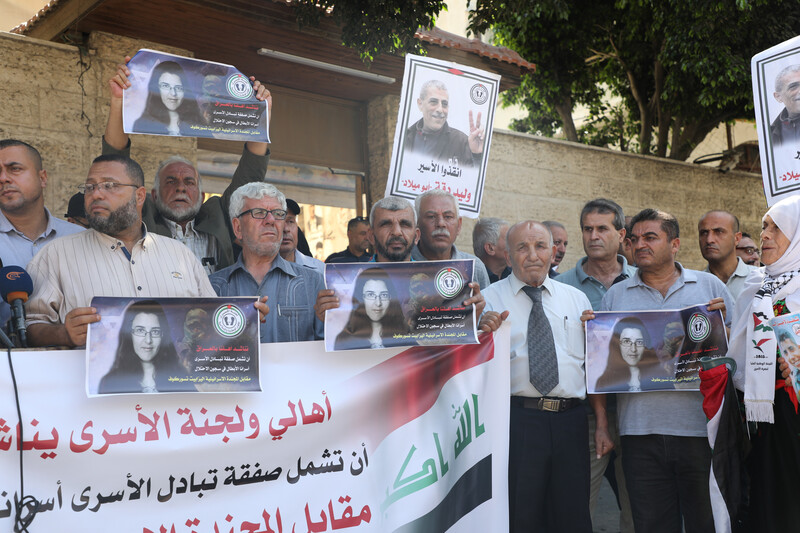
Palestinians take part in a protest in solidarity with prisoners held in Israel in front of the office of the International Committee of the Red Cross in Gaza City on 17 July. Protesters held photos of Elizabeth Tsurkov, an Israeli national who was detained in Iraq in March, although news of her detention was only reported in English during July. A Palestinian prisoners association in Gaza called on Iraq to hand over Tsurkov in exchange for Palestinians held by Israel.
APA images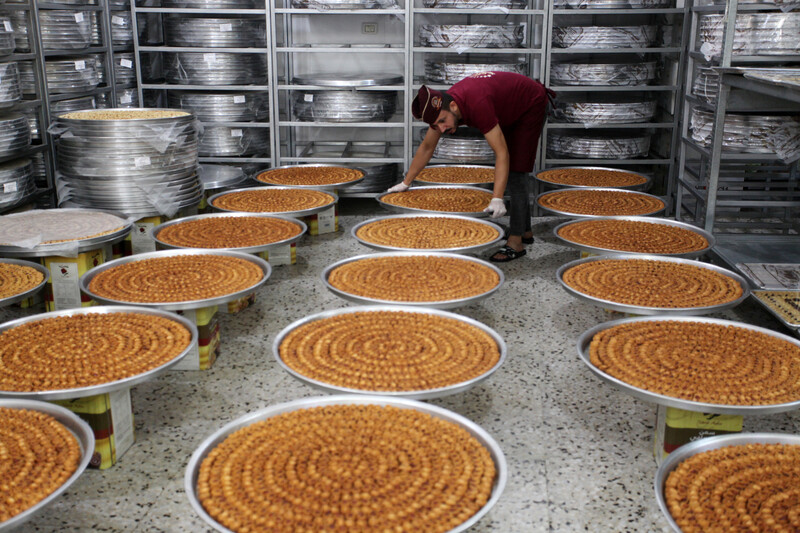
Palestinian vendors prepare sweets at a Gaza City factory ahead of the announcement of the results of the tawjihi matriculation exams, 18 July.
APA images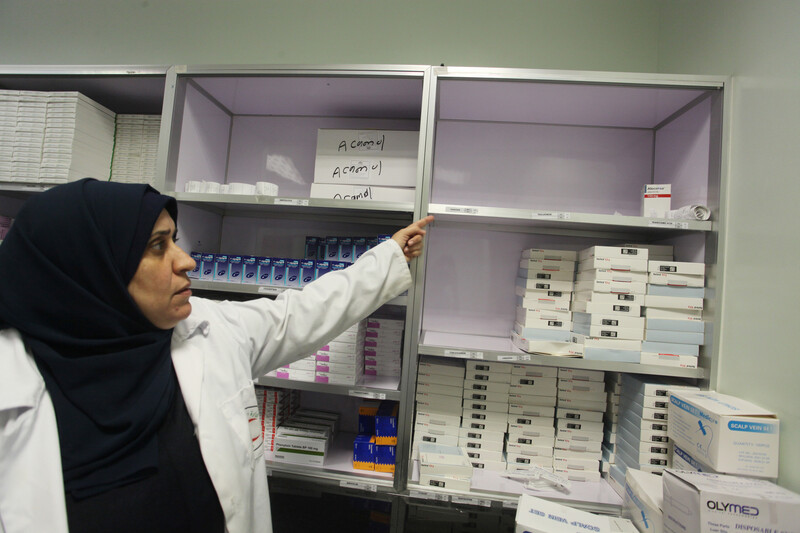
A Palestinian pharmacist points towards a shelf that is empty of medicines at a warehouse in Gaza City on 19 July. The lack of medicines as a result of the siege on Gaza threatens the lives of more than 9,000 cancer patients in the territory, a senior Palestinian health official warned.
APA images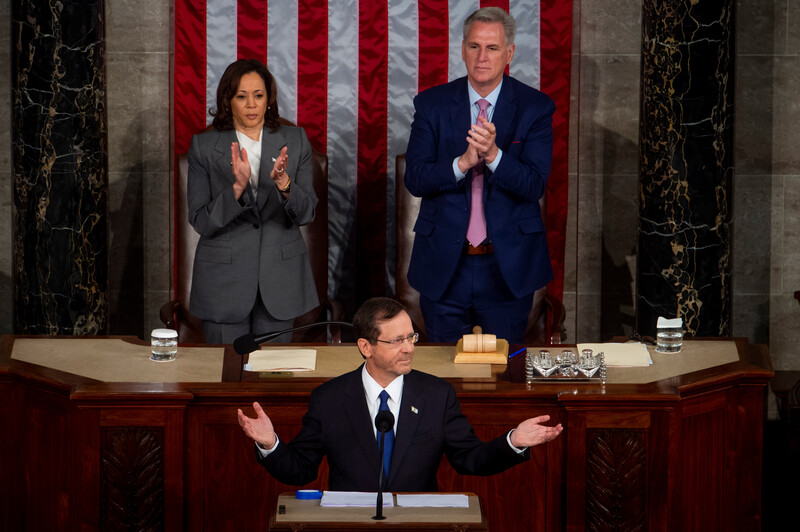
Israeli President Isaac Herzog gives a speech to a packed audience during a joint session of the US Congress in Washington, during which Palestinian rights were nowhere on the agenda and Herzog received multiple standing ovations, 19 July.
CNP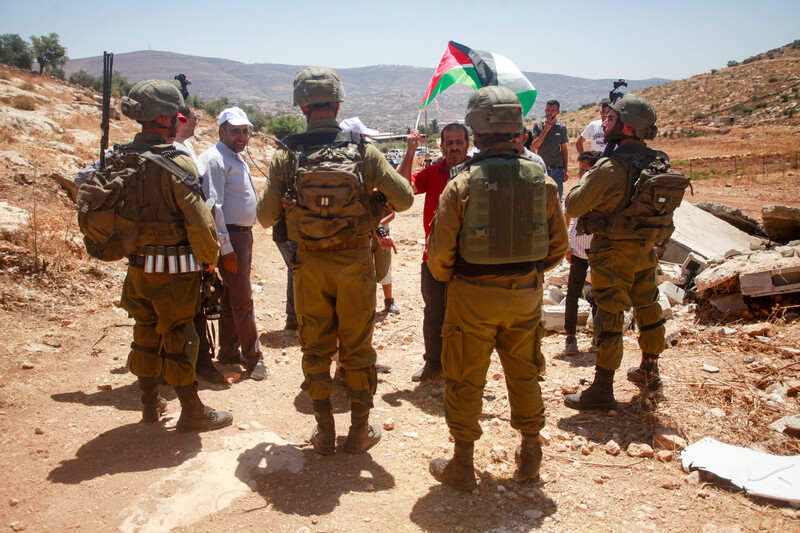
Palestinians argue with Israeli forces during a protest against the establishment of settlement outposts in Beit Dajan, east of the West Bank city of Nablus, 21 July.
APA images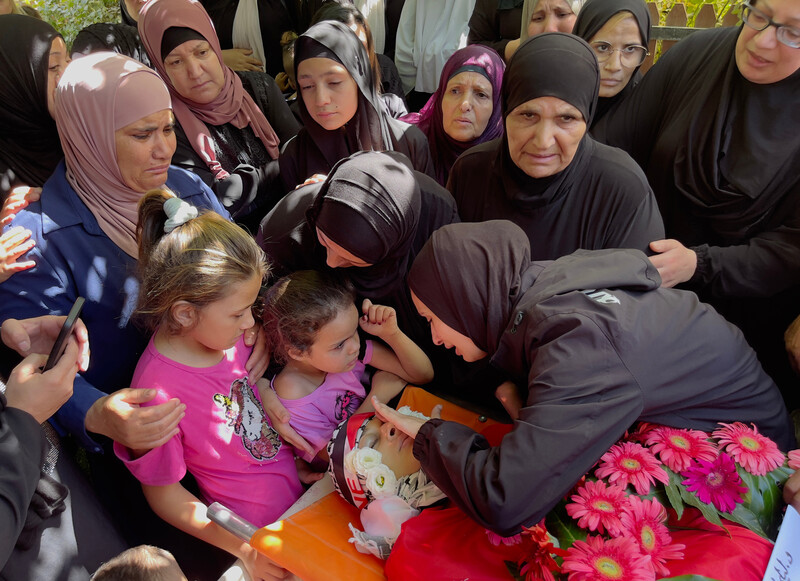
Palestinians mourn over the body of Muhammad Fuad Atta al-Bayid, 16, who was shot in the head by Israeli forces during a protest against Israeli settlements during his funeral in Jalazone refugee camp near the West Bank city of Ramallah, 22 July.
APA images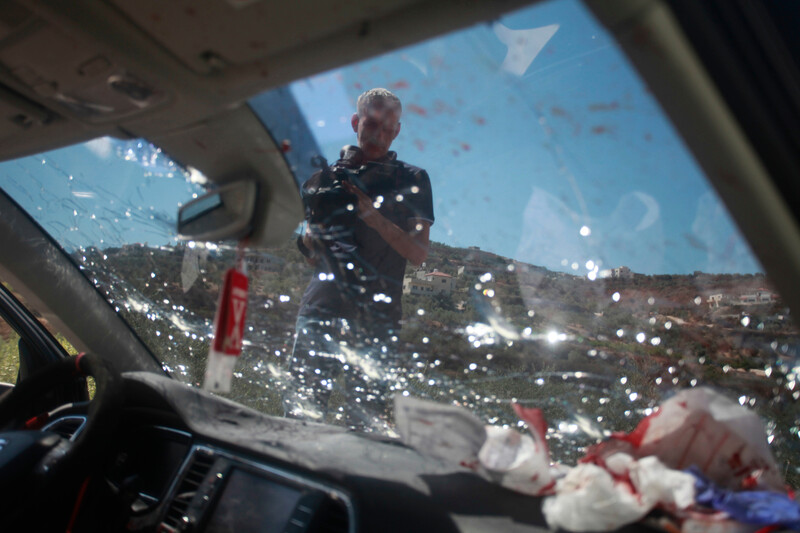
Palestinians stand next to a bullet-ridden car in which a Palestinian was killed by Israeli forces in an incident described by the army as a car ramming attempt but Palestinians said was an ambush in the town of Sebastia near the West Bank city of Nablus, 22 July.
APA images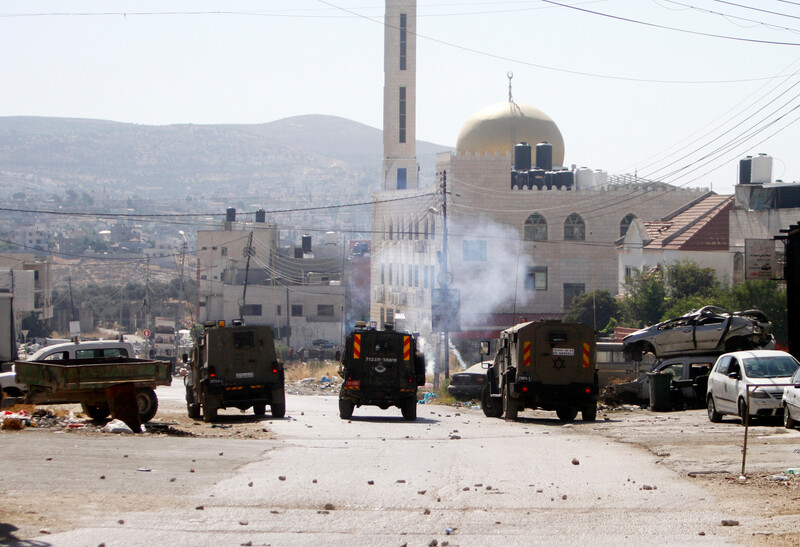
Israeli armored vehicles advance during a military raid at Askar refugee camp east of Nablus in the northern West Bank, 24 July.
APA images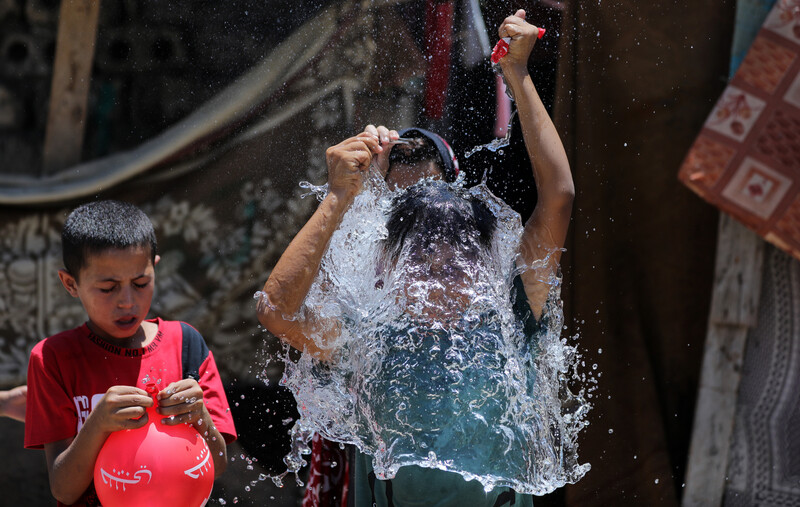
Palestinian children play with water during a heatwave in a slum on the outskirts of Gaza City, 24 July.
NurPhoto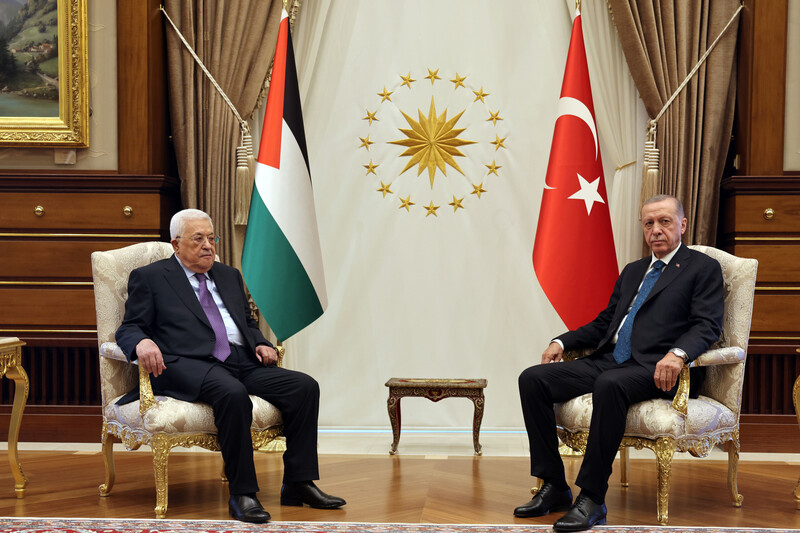
Turkish President Recep Tayyip Erdogan meets Palestinian Authority leader Mahmoud Abbas at the Presidential Complex in Ankara on 23 July.
APA images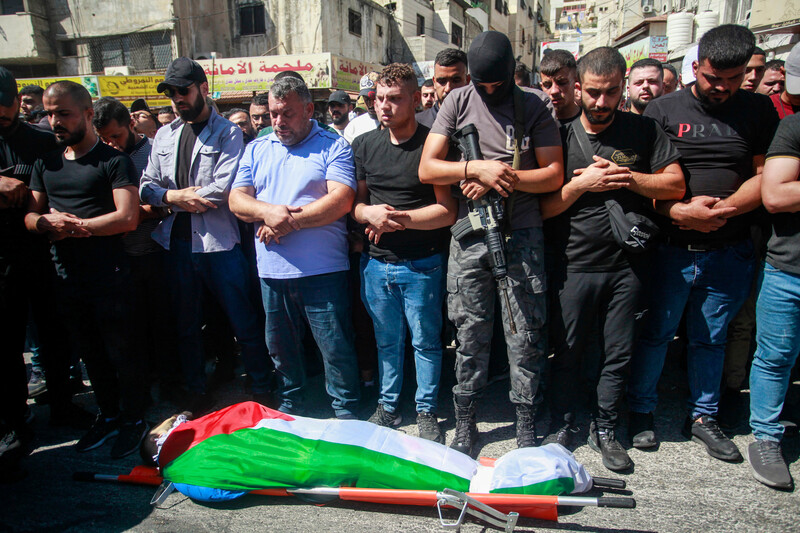
Mourners attend the funeral for Muhammad Abd al-Hakim Naim Nada, 23, who was killed in an Israeli raid in al-Ain camp near the West Bank city of Nablus on 26 July.
APA images
Palestinian fishers sell their catch at a market in Beach refugee camp, west of Gaza City, on 29 July. Israel severely limits Palestinian fishermen’s access to the sea and regularly fires on fishing crews, damaging and confiscating their boats, and often detaining the fishers as well.
APA images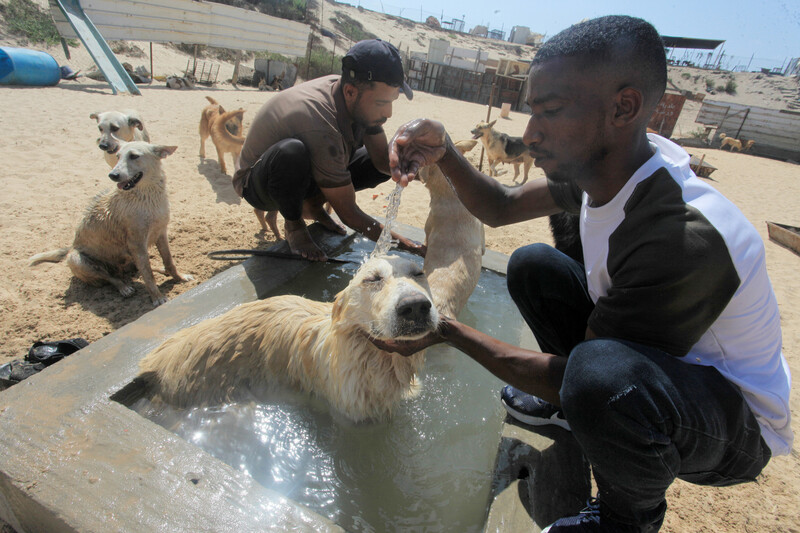
Palestinians spray stray dogs during a heatwave at the Sulala Society for Training and Caring for Animals in Gaza City on 30 July.
APA images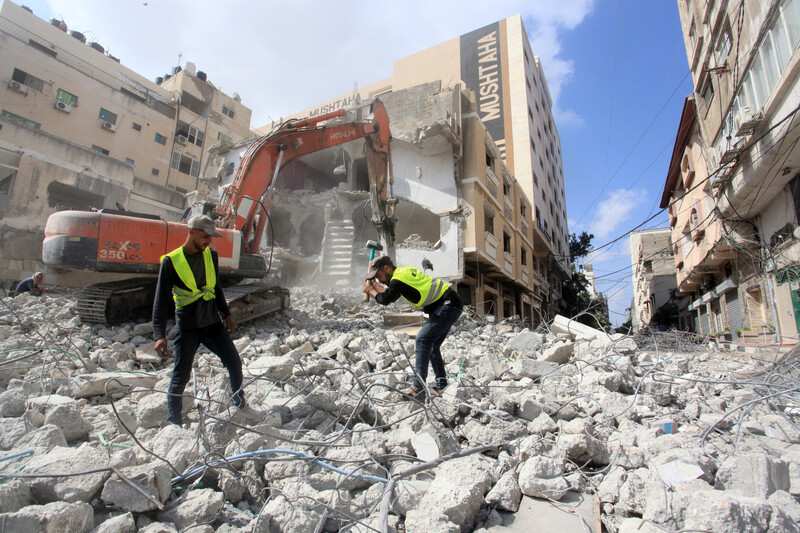
Palestinian laborers work at a construction site during a hot day in Gaza City on 30 July.
APA images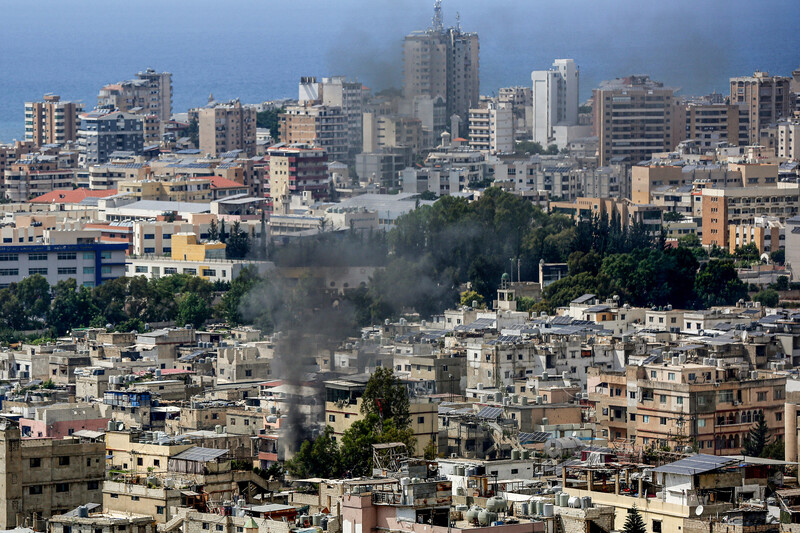
Black smoke billows from Ein al-Hilweh, the largest Palestinian refugee camp in Lebanon located in the southern port city of Sidon, during deadly clashes.
DPA

